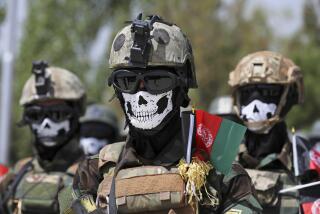End of an Afghan Era
- Share via
Since 1979 the very name Afghanistan has been one more warning to the world that Soviet soldiers flooding across a neighbor’s border were doing no more than acting out destiny.
Now the Kremlin has committed to a May 15 departure date for the first of the 115,000 troops it plans to withdraw from Kabul and other Afghan garrisons in less than a year. Some diplomatic formalities must be handled in Geneva, but the deed is virtually done. And Afghanistan suddenly has become a test tube in which the United States and the Soviet Union will share responsibility for keeping the peace. How it works out will determine whether they can mix some cooperation with their competition for global leadership.
For the first time in eight years, Americans cannot look at Afghanistan primarily as another hot spot in the East-West confrontation. They can take no comfort in the Kremlin’s international embarrassment over invading a neighbor, killing as many as 1 million of its people and still retreating because it could not win.
From now on Washington and all Americans must see Afghanistan for what it is--a barren land dominated by tribal warriors as hard as their mountains, probably the world’s leading exporter of heroin. A goodly number of its warriors share the world view of the Islamic fundamentalists in Iran and hold the United States as much in contempt as they do the Soviet Union.
The fighting is not likely to stop just because the Soviet troops leave. If there are no strangers handy, the moujahedeen will fight among themselves, as they have for decades. If the present leader of the Kabul government, Najibullah,cannot fend off attempts to overthrow him, Afghanistan may have no government at all for a while. Since its last monarch was deposed in a coup, it has been less a nation than a mosaic of fiercely independent villages.
The documents that will be signed in Geneva this week generally pledge Afghanistan and its eastern neighbor, Pakistan, to peaceful relations, a goal that has been pursued for six years by United Nations negotiators. They also call for repatriation of more than 5 million Afghan refugees now living across the border in Pakistan and Iran. The United Nations plans to supervise the move of refugees and, although there is nothing in writing yet, monitor the entire range of agreements to restore peace.
What will force the superpowers to try to cooperate is that they are guarantors for thepeace accords--something like co-signers on a mortgage. Presumably their commitment extends only to relations between the Afghans and the Pakistanis and not to internal tribal feuds or the kind of government that is established in Kabul.
The superpowers have not made things easier for themselves by agreeing that as long as one of them ships weapons to its old Afghan allies, the other can do the same. Keeping the peace and handing out rifles is a dumb combination of duties. At the earliest opportunity, both should quietly agree that there already are too many weapons in Afghanistan and start cutting back the flow. Afghanistan is, after all, a new symbol now, one that the world will watch with at least as much interest as it has all through the 1980s.
More to Read
Sign up for Essential California
The most important California stories and recommendations in your inbox every morning.
You may occasionally receive promotional content from the Los Angeles Times.










